10 Simple Lifestyle Habits That Help You Control Blood Sugar Levels
Reviewed by: Dr. T S Deepthi Sarojini | Author: Manoja Kalakanti
High blood sugar occurs when your body doesn’t make enough insulin or is unable to use it effectively. This can result in the build-up of excess sugar in your blood. If not controlled, it can cause severe damage to the nerves, organs, and blood vessels. Long-term high blood sugar levels can result in hypertension, heart diseases and other major health problems. Family history, obesity and sedentary lifestyle are some of the common causes. The good news is that good lifestyle habits can help you control blood sugar levels.

According to the National Center for Biotechnology Information (NCBI), the prevalence of type 2 diabetes is on the rise worldwide. According to recent data, diabetes prevalence rose from 285 million in 2010 (6.4%) to 439 million in 2030 in adults aged 20 to 79 in different countries.
Diabetes has no cure, but you can reverse it to a great extent and lead a normal healthy life with a few modifications in your lifestyle, specifically your diet.
For people with diabetes, it is essential to keep an eye on food consumption. What you eat can help you control your blood sugar; keep you satiated and keep the urge to binge eat at bay.
Awareness is key to diabetes management. The diseases can be prevented and also managed successfully with the right knowledge. You need to understand what makes your blood sugar levels rise and fall. Learn how to control these factors, and you have a perfect plan to control diabetes.
10 Best Lifestyle Habits to Control Blood Sugar Levels
Controlling your blood glucose levels is critical for your overall health. Diabetes can result in a low quality of life, with your body and mind being constantly plagued with tiredness, fatigue, and other issues. If not managed properly, it could result in severe health complications, including heart diseases, hypertension, kidney disease, and vision loss.
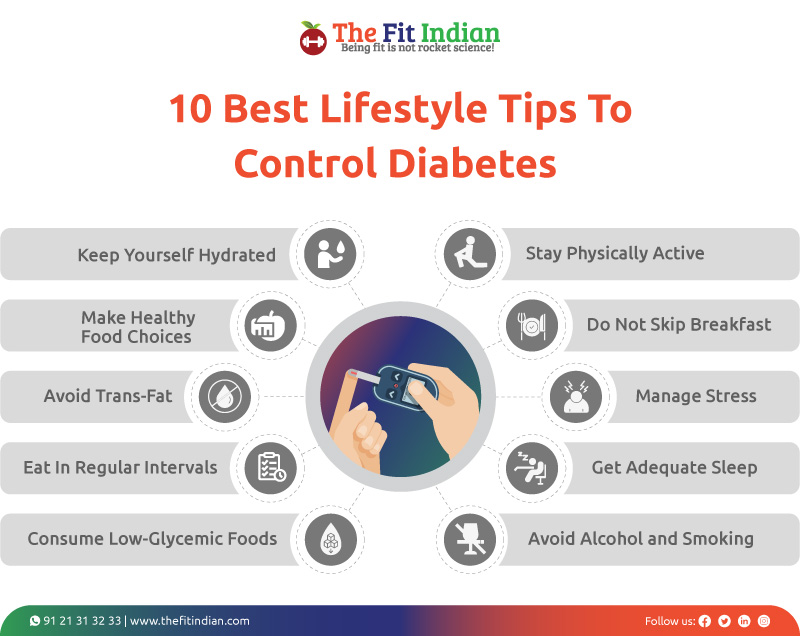
The best way to control diabetes is through lifestyle modification, including a proper diet. Diet is the most important part of managing the condition. Follow these lifestyle tips to control blood sugar levels.
1. Adequate Water Intake
Drinking an adequate amount of water is not only critical for managing diabetes but for overall health. Staying hydrated keeps the blood sugar levels under control. It not only helps you manage diabetes but can even prevent the condition from occurring in the first place. Water helps the kidney flush out excess sugar. But make sure that you avoid sugary beverages and stick to plain water.
2. Healthy Food Choices
Food plays a key role in the effective management of diabetes and is one of the best natural ways to control diabetes. Eating foods that are high in fats, sugar, sodium can cause your sugar levels to spike. It is important that you prefer complex carbs over simple carbohydrates. Try to keep an eye on your carb intake and also include more fibre foods in your diet. Consume less unhealthy fats and replace them with healthy fats such as avocado, nuts, seeds and fatty fish. Go for low dairy consumption, especially high-fat dairy products.
3. Low-glycemic foods
While high-glycemic-index foods cause a quick rise in blood sugar levels, low glycemic index foods raise blood sugar slowly. Thus, making such foods ideal for people with diabetes. Try to include whole grains, fibre-rich and unprocessed foods into your diet. Foods that have a low glycemic index include – apples, oranges, whole grain bread, lentils, kidney beans, peanuts, sweet potato, and chickpeas.
4. Read food labelling for trans-fat
Trans-fats raise your blood cholesterol levels and increase the risk of heart attacks. Studies have shown that people who consume more trans fats are at a higher risk of diabetes. Many packaged food products contain trans fats; hence you must read the label carefully before buying the product.
5. Eat at Regular Intervals
Eating at regular intervals is vital for people with diabetes. Skipping a meal could result in several problems for a person with the condition. It could raise the blood sugar levels, make you eat a large meal, tempt you to eat unhealthy foods, and cause fatigue.
6. Avoid Skipping Breakfast
Breakfast is known as the most important meal of the day; this is even more true in the case of people with diabetes.

A healthy breakfast will keep you satiated, discouraging you from overindulging in foods, especially binge eating on unhealthy junk foods. Insulin sensitivity is higher in the morning; thus, eating breakfast on time helps you control blood sugar levels. Skipping your breakfast may result in fluctuations in blood glucose levels.
7. Walk 10,000 Steps Per Day
Studies show that walking or jogging 10,000 steps each day can improve insulin sensitivity, thus lowering the risk of developing diabetes. It has many benefits; it can lower your weight and reduce stress, therefore lowering the risk of diabetes and other diseases. You can engage in various exercises such as – walking, running, swimming, hiking, and weight lifting. Try to climb stairs whenever possible; you can measure your steps with tools and count the calories burnt. Various studies also back the importance of exercise to control diabetes.
8. Manage Stress
Stress management is an important part of diabetes management. Stress can trigger many health issues and cause problems in diabetes management. Managing the condition itself can cause stress. Stress can release stress hormones such as glucagon and cortisol, which can have an impact on glucose levels. So, it is important that you manage stress to control blood sugar levels. You can engage in physical activity, follow a hobby, practice meditation and yoga to manage stress.
9. Get Enough Sleep
A lack of sleep can result in severe health issues. It could also cause problems in your diabetes management. Good sleep is a must for a healthy body and mind. Lack of sleep can result in an increase in appetite, which can cause weight gain. It can also affect blood sugar levels and insulin sensitivity. Ensure that you get quality sleep each night and maintain a consistent sleep schedule.
10. Avoid Alcohol and Smoking
Alcohol has lots of calories and can cause fluctuations in blood sugar levels. It can also interfere with your diabetes medicines. Alcohol can also increase the risks of other health conditions such as hypertension.
Smoking is one of the causes of diabetes, and people who smoke are more likely to develop the condition compared to those who don’t smoke. Smoking also makes it more difficult to manage the condition. Smoking can cause several health problems such as heart disease and high blood pressure. The risks of developing such conditions are higher if you have diabetes and smoke. The high levels of nicotine can lower the effectiveness of insulin and makes it challenging to regulate it.
These are some of the simplest home remedies to control diabetes. Through the above lifestyle changes, you can prevent or manage diabetes and return to normal health. Let us now take a look at the best and worst foods for a person with diabetes.
List of Best And Worst foods for diabetic patients
As you already know, diet is perhaps the most important part of diabetes management. What you eat directly impacts blood glucose levels, and thus it is important to keep an eye on what’s on your plate.
Here is a list of the worst and best food for diabetes control. Ensure that you include more healthy foods and limit or avoid unhealthy foods.
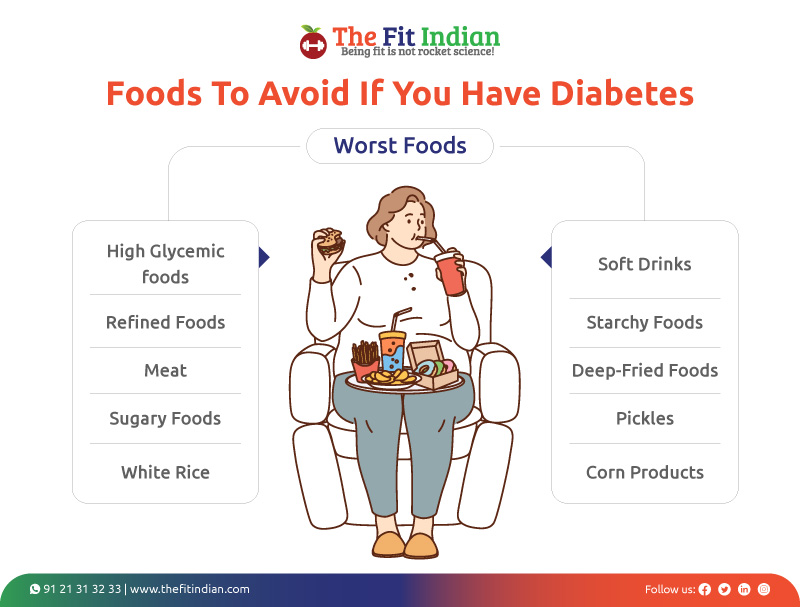
Worst Foods
Most of these foods cause an instant spike in your blood sugar levels, are high in calories and are often devoid of many nutrients.
1. Refined Foods
People who consume foods that are highly processed are more likely to develop diabetes. Refined foods are high in sugar, salt, fat, and empty calories. Much of the nutrition is stripped away during the production process. Such foods raise blood sugar levels and cause other problems such as heart attacks, obesity, and hypertension. Choose whole natural foods instead.
Sources: Candy, soda, sugary cereals, pastries, white bread, white rice, white flour
Reasons to avoid:
- Low in fibre
- Highly processed
- Low in macronutrients
2. Meat
While lean meat and fish have health benefits, processed and red meat are known to cause several health problems, including diabetes and heart attacks. Even small amounts of such meat can increase the risk of diabetes.
Sources: Processed meat and red meat
Reasons to avoid:
- Increased risk of mortality
- High risk of cardiovascular diseases
- Higher levels of saturated fats
3. High Glycemic Foods
Foods that have a high glycemic index are quickly absorbed into the bloodstream as they are digested in a short span.

This raises blood glucose levels. These foods are rich in carbohydrates. Try to consume fibre-rich foods that digest slowly, thus causing a slow blood sugar level rise.
Sources: White rice, potatoes, popcorns, candy
Reasons to avoid:
- Usually triggers a large insulin response
- Rapidly spikes the blood sugar level
4. High-Sugary Foods
Foods high in sugar content can cause a spike in blood sugar levels. They are usually unhealthy, with harmful ingredients and little nutritional value.
Sources: Creamy salad dressing, low-fat yoghurt, spaghetti sauce, milk chocolate
Reasons to avoid:
- High-sugar consumption causes insulin resistance
- Contains more saturated and trans fat
5. Soft Drinks
Soft drinks are high in sugar; thus, they can disrupt your insulin levels and cause a spike in blood glucose levels. They also do not offer any nutritional benefits.
Sources: Sodas, fruit drinks, sports drinks
Reasons to avoid:
- Raise your blood sugar levels
- Risk of High blood pressures
- Risk factor for more metabolic syndrome
6. Starchy Foods
Starchy foods can cause a rise in blood sugar levels. But they are also part of a balanced diet. It is important to choose the right kind of starchy food such as vegetables and legumes.
Sources: Potato, maize, pasta, biscuits, muffins
Reasons to avoid:
- Difficult to metabolize
- Raises blood sugars quickly
- Not recommended for those with celiac disease
7. Deep-Fried Foods
Deep-fried foods can cause obesity, high blood pressure and high cholesterol levels, which are all risk factors of diabetes. They are rich in simple carbs and fats; hence they must be avoided. Traditional Indian deep-fried foods must be especially avoided.
Sources: Wada, puri, mirchi bajji, pakodas
Reasons to avoid:
- Increases risk of heart diseases
- Increases risk of type 2 diabetes
- Has a high amount of triglycerides
8. White Rice
White rice is refined or processed rice; it is what remains after much of the nutrients are stripped off from whole rice.
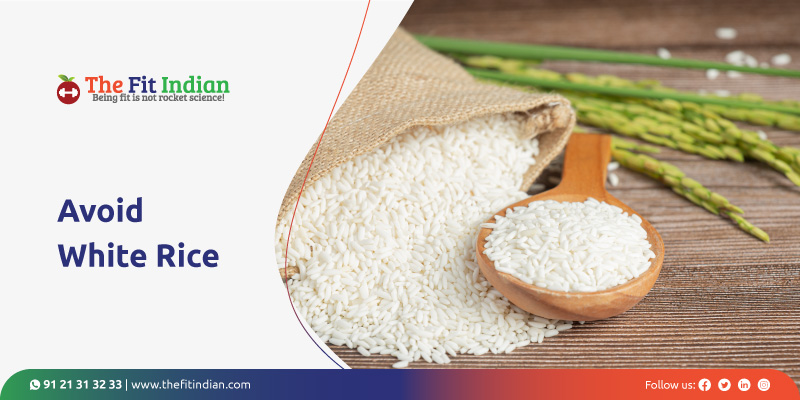
It is a fast-digesting carbohydrate that quickly raises glucose levels. It does not have the satiating effect of whole rice, thus causing you to eat more.
Sources: Ponni, sona masuri, njavara
Reasons to avoid:
- High glycemic index
- Hull and bran germ is removed
- Has only 0.3 % of fibre
- A poor source of vitamins and minerals
9. Pickles
Pickles may be tempting, but they are not such a good idea for people with diabetes. Pickles are extremely high in sodium; hence they must be avoided.
Sources: Mango pickle, lemon pickle with (mustard seeds)
Reasons to avoid:
- High risk of blood pressure
- It has a high amount of sodium
- Risk of kidney problems
- Risk of gastritis
10. Corn Products
While natural corn is healthy and can be consumed by those with diabetes, most corn products must be avoided. Products such as corn tortillas, corn flakes, and chips are high glycemic index foods.
Sources: Corn flour
Reasons to avoid:
- Effects the blood sugar levels
- Has a high amount of starch
- Has a high amount of carbohydrates
Now, let’s take a look at some of the healthiest food options for people with diabetes.
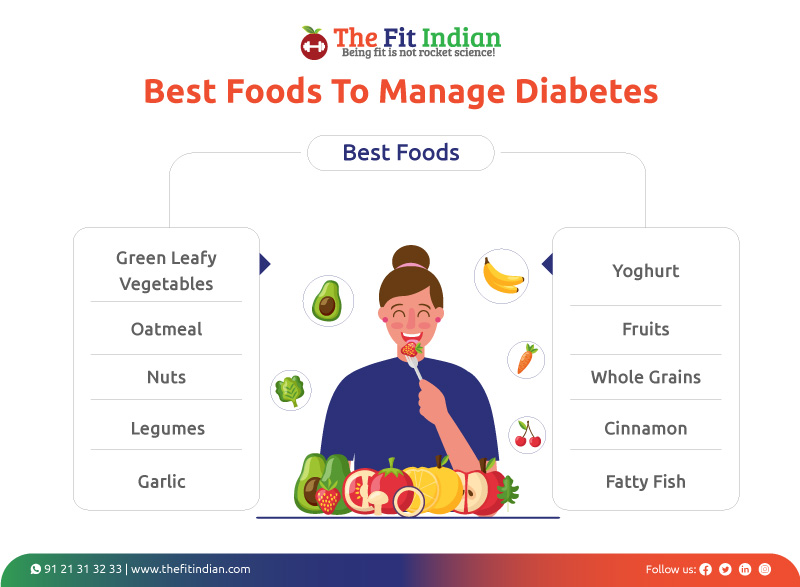
Best foods
Check out the list of foods that lower blood sugar. These foods are usually rich in fibre and cause a slow rise in sugar levels. They are highly nutritious and prevent many health problems.
1. Oatmeal
Oatmeal is one of the healthiest and most fulfilling breakfast options, and they do not cause a spike in blood sugar levels since they have a low glycemic index. It also improves insulin sensitivity. But try to limit the consumption since it is high in carbohydrates.
Sources: Raw oats, roll oats, Scottish oat mill, instant oatmeal
Reasons to add in diet:
- Helps in diabetes management
- Lowers blood sugar levels
- Low glycemic index
2. Nuts
Nuts are nutritious, have a low glycemic index and are rich in fibre. They are also delicious! But it would be best if you ate unprocessed raw nuts.
Sources: Almonds, walnuts, Brazil nuts, hazelnuts
Reasons to add in diet:
- Rich in healthy fats
- Rich in vitamins and minerals
- Lowers cholesterol levels
3. Legumes
Legumes have a low glycemic index and are rich in nutrients. They can also prevent several other health conditions such as heart disease.
Sources: Black beans, green gram dal, fresh green peas and dry peas, chickpeas
Reasons to add in diet:
- Stabilizes blood sugar levels
- Low Glycemic food
- Controls lipid levels
4. Garlic
Garlic has been a part of cuisines and traditional medicines for its medicinal properties. The compounds in garlic may improve insulin sensitivity.
Sources: Asiatic, turban, rocambole, glazed purple stripe
Reasons to add in diet:
- Help with carbohydrate metabolism (rich in Vitamin B6)
- Lowers sugar levels
- Rich in potassium (replaces potassium which gets lost in urine)
- Zinc and sulphur (components of insulin)
5. Green Leafy Vegetables
Your parent’s advice on eating your vegetables may not sound so bad now. Vegetables are loaded with nutrients and are necessary for optimal health. They are rich in fibre, low on the glycemic index and can help prevent several health conditions.

Sources: Spinach, amaranth, radish leaves, fenugreek leaves
Reasons to add in diet:
- Improves insulin sensitivity
- Lowers Blood sugar levels
- Good storage of all nutrients and vitamins
6. Yoghurt
Yoghurt is a low glycemic index food that can prevent the development of the condition. It is perhaps the healthiest dairy product for people with diabetes. But make sure that you avoid the sweetened and flavoured versions.
Sources: Plain yoghurt (fermentation process)
Reasons to add in diet:
- Probiotic food
- Improves digestion
- Reduces risk of type 2 diabetes
7. Fruits
Fruits are extremely rich in nutrients and can help prevent and manage several health conditions, making them a critical part of a balanced diet. But you must avoid fruit juices and fruits high in the glycemic index, such as ripe bananas. Try consuming low glycemic index fruits that are rich in water and fibre content.
Sources: Apple, orange, sweet lime, watermelon, muskmelon, guava
Reasons to add in diet:
- Rich in vitamins and minerals
- Alters the body’s mechanism
- Low in glycemic index
8. Whole Grains
Whole grains keep the blood sugar levels stable as they are low glycemic foods and rich in fibre. They are also much more nutritious than their refined counterparts.
Sources: Brown rice, whole wheat, oats
Reasons to add in diet:
- Safe for people with type 2 diabetes
- Insulin sensitivity secretion
- Helps with digestion
- Rich in fibre
9. Cinnamon
Cinnamon is rich in antioxidants and help in keeping several health problems at bay. Studies have shown that it can improve blood sugar levels and lower insulin resistance.
Sources: Cinnamon tea, in the form of soups
Reasons to add in diet:
- Lowers blood sugars
- Maintains blood sugar levels
- Resinous compounds
10. Fatty Fish
Fatty fish are highly nutritious and low on the glycemic index, which makes them ideal for people with diabetes. They contain healthy fats which can prevent diseases related to diabetes, such as heart diseases.
Sources: Salmon, tuna, sardines
Reasons to add in diet:
- Rich in omega-3 fatty acids
- Inevitable micronutrients that are good for diabetic patients
- Low in calories
Following these dietary tips can help you control blood sugar levels and lead a healthy life. For more diabetes control tips and a customized diet plan, you can get nutritional support.
Bottomline
No doctor, dietician, nutritionist, or fitness expert can magically prevent or cure diabetes. Ultimately it all comes down to you and your resolve to successfully control blood sugar levels. Consistently follow expert advice and see the results for yourself. With the proper diet and lifestyle, diabetes is both preventable and manageable.
FAQ’s
1. What’s the best way to take control of diabetes?
The best and most effective way to control diabetes is through a lifestyle change. You can engage in more physical activity, manage stress, eat a healthy diet, quit smoking and avoid or limit alcohol to manage the condition.
2. How can diabetes be controlled?
Lifestyle changes such as dietary modifications are key in diabetes control. Consume a healthy diet low in calories, trans fat, saturated fat, salt and sugar. Eat whole grains, vegetables, fruits, nuts, fish and lots of fibre.
3. What foods help lower blood sugar quickly?
Foods that can control blood sugar levels include:
- Certain fruits such as – apples, avocado, and oranges
- Vegetables such as – broccoli, green peas, tomato, cucumber, spinach and kale
- Whole foods such as – whole wheat, oatmeal, nuts, seeds, eggs and fish
4. How to control diabetes with Indian food?
An Indian diet that is rich in fibre is suitable for diabetes control. A diet rich in whole grains, vegetables, pulses, legumes, fruits, and fish is ideal.
5. How to manage diabetes at home?
You can manage diabetes at home through some simple steps.
- Keep yourself hydrated
- Exercise regularly
- Monitor your blood sugar levels
- Eat foods that are low in glycemic index
- Control your carb intake
6. Which is the best way to control type 1 diabetes?
You can control type 1 diabetes with the following steps:
- Constantly monitor your blood sugar levels
- Maintain a healthy diet
- Engage in regular physical activity
- Manage carb intake
- Take insulin
- Maintain healthy weight
7. Are there any natural remedies to control diabetes?
Yes. There are several natural ways through which you can control diabetes.
- Include PUFA and MUFA (Polyunsaturated fatty acids, monounsaturated fatty acids) in the diet
- Get enough sleep
- Eat less salt
- Try limiting foods that are high in sugar
- Avoid trans fats
- Eat less meat and processed meat
- Consume low-glycemic foods
- Check glucose levels regularly
8. How to control weight loss due to diabetes?
Diabetes can result in weight loss. To control this, you can keep an eye on calorie intake, consume calorie-rich foods such as nuts and seeds, eat frequent smaller meal portions, include nutritional supplements in your diet and consume more protein.
9. How to control early diabetes?
With a few simple steps, you can prevent diabetes from happening. All you need to do is:
- Drink lots of water
- Avoid or limit sugar
- Limit refined carbohydrate
- Avoid sedentary lifestyle
- Exercise daily
10. Can you reverse type 2 diabetes?
There is no cure for diabetes. But some people can bring their sugar levels to a normal level and even reverse the condition. This can be achievable with a proper diet, weight loss and a healthy lifestyle.

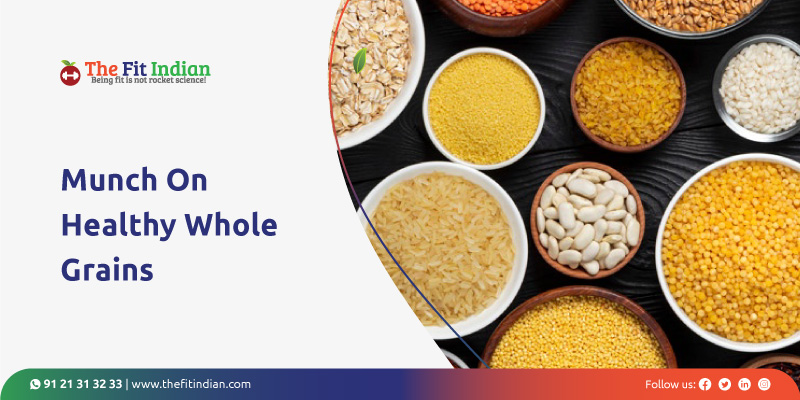



Manoja Kalakanti